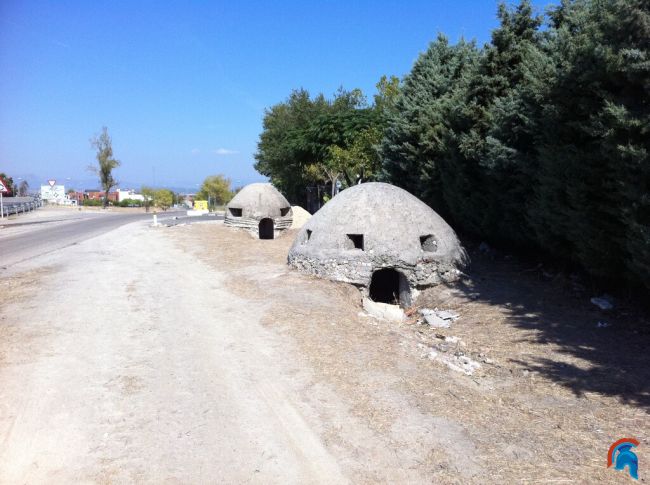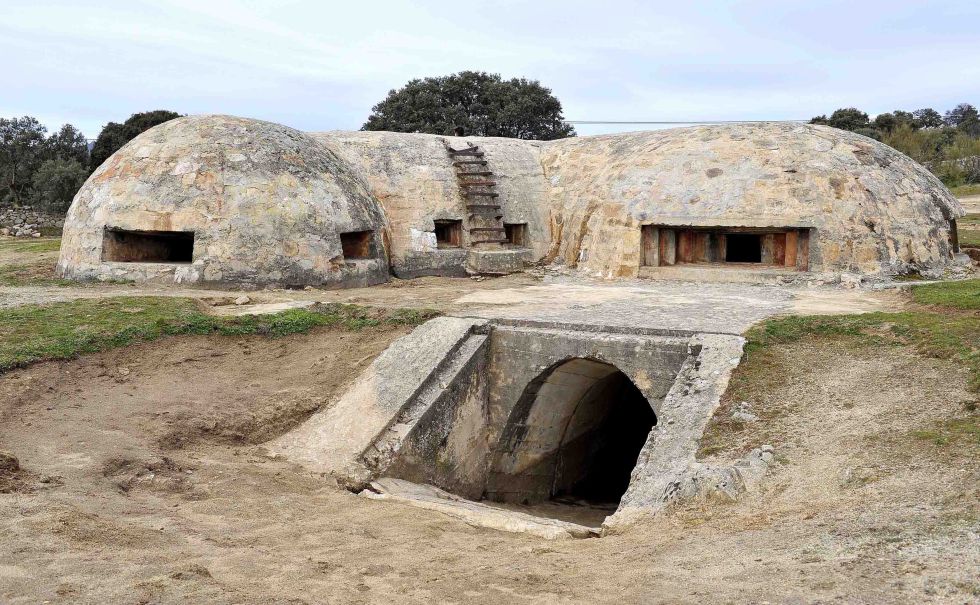Historical Situation
Our names are Abdellah and Luis and in this blog we are going to talk about the time in which the Spanish Civil War took place, the conditions of the different countries which played a role in the war at that time, how people lived in that period and the reasons that made either the Nationalists or the Republicans want to start a war. We hope you will find this blog as useful as we want it to be.
viernes, 20 de junio de 2014
Compilation of resources
Brunete photogallery:
http://historicalsituationostravamamadrid.blogspot.cz/2014/06/some-days-after-we-had-visited.html
Guadarrama photogallery:
http://historicalsituationostravamamadrid.blogspot.cz/2014/06/sierra-de-guadarrama-madrid.html
Spanish Civil War photogallery (at the end of the page):
http://historicalsituationostravamamadrid.blogspot.cz/2014/06/spain-before-and-during-years-30s_18.html
http://historicalsituationostravamamadrid.blogspot.cz/2014/06/some-days-after-we-had-visited.html
Guadarrama photogallery:
http://historicalsituationostravamamadrid.blogspot.cz/2014/06/sierra-de-guadarrama-madrid.html
Spanish Civil War photogallery (at the end of the page):
http://historicalsituationostravamamadrid.blogspot.cz/2014/06/spain-before-and-during-years-30s_18.html
Brunete, Madrid.
Some days after we had visited Guadarrama, we went to the spanish town of Brunete where really important things occured while the Spanish Civil War was happening.
Here are some others photos of the bunkers we saw there:




Here are some others photos of the bunkers we saw there:



Sierra de Guadarrama, Madrid.
Last year we went on a trip to Sierra de Guadarrama where part of the Spanish Civil War took place and we wanted to share some pictures with you in order to make you aware of how it was.
These are some of the bunkers we visited:


miércoles, 18 de junio de 2014
Main topic
Spain before and during the years 30s
Spain's
neutrality in World War I allowed
it to become a supplier of material for both sides to its great advantage,
prompting an economic boom in Spain. The outbreak of flu spread in Spain and
elsewhere, along with a major economic slowdown in the postwar period, hit
Spain particularly hard, and the country went into debt. A major worker's strike was
suppressed in 1919.

Spanish colonial policies in Spanish
Morocco led to an uprising
known as the Rif War;
rebels took control of most of the area except for the enclaves
of Ceuta and Melilla in 1921. King
Alfonso XIII decided to
support the dictatorship of General Miguel Primo
de Rivera in 1923. As Prime
Minister Primo de Rivera promised to reform the country quickly and restore
elections soon. He deeply believed that it was the politicians who had ruined
Spain and that governing without them he could regenerate the nation. His
slogan was "Country, Religion, Monarchy."

The late 1920s were prosperous until the worldwide
Great Depression hit in 1929. In early 1930 bankruptcy and massive unpopularity
forced the king to remove Primo de Rivera. Historians depict an idealistic but
inept dictator who did not understand government, lacked clear ideas and showed
very little political acumen. He consulted no one, had a weak staff, and made
frequent strange pronouncements. He started with very broad support but lost
every element until only the army was left. His projects ran large deficits
which he kept hidden. His multiple repeated mistakes discredited the king and
ruined the monarchy, while heightening social tensions that led in 1936
to a full-scale Spanish Civil War. Urban voters had lost faith in the
king, and voted for republican parties in the municipal elections of April
1931. The king fled the country without abdicating and a republic was established.

1930 a 1936
Political ideologies were intensely polarized, as both right and
left saw vast evil conspiracies on the other side that had to be stopped. The
central issue was the role of the Catholic Church, which the left saw as the
major enemy of modernity and the Spanish people, and the right saw as the
invaluable protector of Spanish values.
Power seesawed back and forth, 1931-36 as
the monarchy was overthrown, and complex coalitions formed and fell apart. The
end came in a devastating civil war, 1936–39, which was won by the
conservative, pro-church, Army-backed “Nationalist” forces supported by Nazi
Germany and Italy. The Nationalists, led by General Francisco Franco,
defeated the Republican coalition of liberals, socialists, anarchists, and
communists, which was backed by the Soviet Union.
Under the Second Spanish Republic, women were allowed to
vote in general elections for the first time. The Republic devolved
substantial autonomy to the Basque
Country and to Catalonia.

The first governments of the Republic were
center-left, headed by Niceto Alcalá-Zamora and Manuel Azaña.
Economic turmoil, substantial debt, and fractious, rapidly changing governing
coalitions led to escalating political violence and attempted coups by right
and left.
In 1933, the right-wing Spanish
Confederation of the Autonomous Right (CEDA),
based on the Catholic vote, won power. An armed rising of workers in October
1934, which reached its greatest intensity
in Asturias and Catalonia, was forcefully put down by the CEDA
government. This in turn energized political movements across the spectrum in
Spain, including a revived anarchist movement and new reactionary
and fascist groups, including the Falange and a
revived Carlist movement
Spanish civil war
The Spanish Civil War ( Guerra Civil Española)] was fought from 17
July 1936 to 1 April 1939 between the Republicans, who were loyal to the
democratically elected Spanish Republic, and the Nationalists, a rebel group
led by General
Francisco Franco. The Nationalists prevailed, and Franco ruled Spain for
the next 36 years, from 1939 until his death in 1975.
The war began after a declaration of
opposition by a group of generals of the Spanish
Republican Armed Forces, under the leadership of José Sanjurjo,
against the elected government of the Second Spanish Republic, at the time
under the leadership of President
Manuel Azaña. The rebel coup was supported by a number of conservative
groups, including the Spanish
Confederation of the Autonomous Right, monarchists such as the religious
conservative Carlists, and the Fascist
Falange.
It was marked by numerous small battles
and sieges, and many atrocities, until the rebels (the
"Nationalists"), led by Francisco Franco, won in 1939. There was
military intervention as Italy sent land forces, and Germany sent smaller elite
air force and armored units to the rebel side (the Nationalists). The Soviet
Union sold armaments to the "Loyalists" ("Republicans"),
while the Communist parties in numerous countries sent soldiers to the
"International Brigades." The civil war did not escalate into a
larger conflict, but did become a worldwide ideological battleground that
pitted the left and many liberals against Catholics and conservatives. Britain,
France and the U.S. remained neutral and refused to sell military supplies.
Worldwide there was a decline in pacifism and a growing sense that another
world war was imminent, and that it would be worth fighting for.
Foreign involvement
The Spanish Civil War had large numbers of non-Spanish citizens
participating in combat and advisory positions. The governments of Germany,
Italy, --and to a minor extent Portugal—contributed money, munitions, manpower
and support to Nationalist forces led by Francisco Franco. The
government of the Soviet Union, and to a lesser extent France and Mexico,
likewise aided the "Loyalist" or "Republicans" of the Second Spanish
Republic. The aid came even after all the European powers had signed a Non-Intervention
Agreement in 1936. While
individual sympathy for the plight of the Spanish Republic was widespread in
the liberal democracies however, pacifism and the fear of another world war
prevented them from selling or giving arms. The Nationalist requests meanwhile
were answered within days by Hitler and Mussolini.
Those who did not support either one of
both sides were the United Kingdom nor the United States-
The United Kingdom proclaimed itself neutral;
nevertheless, the British establishment tended to prefer a Nationalist victory
as they defended anti-communism. The ambassador to Spain, Sir Henry Chilton, believed
that a victory for Franco was in the establishment's best interests and worked
to support the Nationalists and the British Foreign Secretary Anthony Eden publicly maintained the official
policy of non-intervention but privately expressed a preference for a
Nationalist victory. He also testified that his government "preferred a
Rebel victory against the Republicans.
The U.S. saw Soviet involvement in the 1931 ouster of the
Spanish monarchy, though there is little evidence of significant involvement.
In 1931, Herbert Hoover was President of the United States.
The U.S. was thus hostile to the new Republican government. Tensions escalated
when the Manuel Azaña government expropriated the pro-
fascist International Telephone &
Telegraph. When the Civil War erupted after the failed right-wing goverment
overthrow, Cordell Hull, current
Secretary of State at that time, moved quickly to ban arms sales to the Spanish
government, forcing the Popular Front to turn to the Soviet Union for
support. From the outset the Nationalists received important support from some
elements of American business. On 5 August 1936, the United States had made it
known that it would follow a policy of non-intervention, but did not announce
it officially. President Franklin D. Roosevelt ruled out US interference with the
words: there should be no expectation that the United States would ever again
send troops or warships or floods of munitions and money to Europe.
Here is a map of the area dominated by both sides during the four years of Spanish Civil War

Here is a map of the area dominated by both sides during the four years of Spanish Civil War

Here are some of the pictures that best show the historical situation at that time:
Suscribirse a:
Entradas (Atom)



